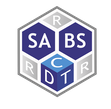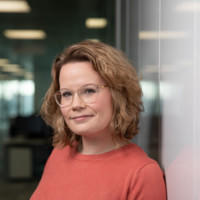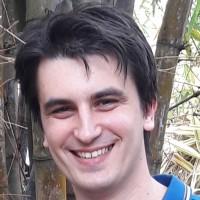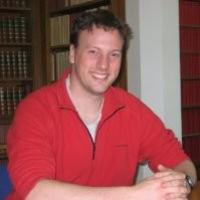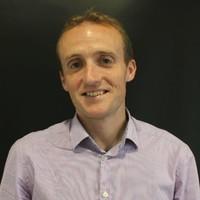Graduate Destinations
Collectively the DTC has a strong record of alumni success with around 60% of students going on to pursue academic careers and 20% entering into industrial research. Our alumni have also been responsible for at least 11 start-up companies, some with investment in the millions, and over 30 granted or pending patents (at least 15 of these arising directly from their DPhil work). Many students who have gone on to successful careers are invited back to talk to current students within the Research Skills sessions.
Case Studies
Dr Sara Dutta
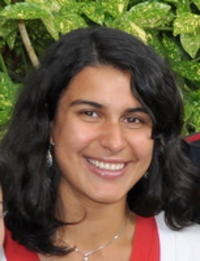
Dr Sara Dutta (SysBio DTC 2009-2014): “I believe being an interdisciplinary scientist is essential nowadays and the DTC provides a great environment in which to become one. This belief has been strengthened now that I have graduated and have seen myself and fellow colleagues move on to the next stages of our careers. Researchers with skills such as the ones that the DTC has helped us develop are highly coveted these days. Having studied computer science as my undergraduate degree, I enjoyed learning about the many ways it could be combined with other fields such as mathematics and physics in order to unravel new biological mechanisms. The first year provided the perfect platform for me to get a better idea of the specific field I wished to work in. I quickly developed an interest in cardiac modelling, and completed my summer project and my DPhil in that field. The transition from my DPhil to my current position at the FDA was very smooth, thanks to my specific set of skills that matched their needs and the existing close collaborations with Oxford. I am very excited to work at the intersection of science and policy making, where I can apply the array of skillsets (ranging from biology to team working) the DTC has taught me while staying within the cardiac modelling field.”
Sara is now ORISE Fellow at the Food & Drug Administration, USA, investigating the use of cardiac computational models to test drug safety as part of the Comprehensive In Vitro Proarrhythmia Assay (CIPA) initiative.
Dr Courtney Bishop
Dr Courtney Bishop (LSI DTC 2007-2011): “I joined the LSI DTC knowing that I wanted to make the transition from a Chemist to the broad field of Life Sciences, but with no strong idea as to the specific application area that I wished to pursue. To me, the attraction of the DTC was the modular taught courses in the first year, enabling me to explore many different life science application areas before selecting the one that I was most passionate and interested in – biomedical imaging. The DTC also gave me the confidence to mould and drive my own research forward, encouraging multinational collaborations and contacts. These skills, and others, have served me well in my current career as an MR Analyst at Imanova Limited, where I regularly interact with both UK and non-UK imaging sites and commercial clients, working in collaboration with others to develop bespoke image analysis pipelines and study protocols to meet individual client needs, and presenting my work at international conferences.”
Dr Sara-Jane Dunn
Dr Sara-Jane Dunn (LSI DTC 2007-2011): “I started the LSI DTC having completed a Masters in Mathematics, knowing that I wanted to move into interdisciplinary research. Transitioning into the life sciences when you’ve been immersed in the physical sciences is not easy – at the very least, there is an entirely new language to learn. The first year of the DTC enabled me to make this shift. I not only gained fundamental biological knowledge through the taught courses, but I also learnt coding and programming skills that were not part of my undergraduate learning. A huge part of the value of the DTC is its interactive nature, where you get to work with and alongside students from different disciplines, meaning that there is a natural flow of peer-to-peer learning. Subsequently, for my DPhil, I was able to craft a research direction of my own choosing, which is invaluable to establish ownership and independence in your research. Upon finishing my DPhil I took up a Postdoc position at Microsoft Research, where I recently became a full-time Scientist, still working at the interface of biology and mathematics. Undertaking my doctorate through the DTC set me on this path – it gave me a firm foundation for interdisciplinary research, a close network of peers, and confidence in engaging with new concepts on unfamiliar territory.”
Dr Jochen Klingelhoefer
Dr Jochen Klingelhoefer (LSI DTC 2006-2010): “After a joint undergraduate degree in Electrical Engineering from Bristol and Kassel (Germany) I ended up working as an ASIC Design Engineer in the Mobile Communications industry. It was a great time with a steep learning curve, but a year and a bit in I started wondering whether this would be a fulfilling career for more than another year - in the end, I was just helping to develop slightly better versions of existing mobile phones and GPS receivers. I started to look around and came across the LSI DTC programme. After reading the prospectus, I was 100% convinced that this was the right place to bring together my engineering background and my interests in life sciences and biology. The course turned out to be intense, but even more so thrilling! Its modules cover a wide range of topics and allow for a true bird's eye view of the Life Sciences Interface. Collaboration and working relations with DTC students from a wide range of backgrounds formed naturally and plentifully. This resulted not only in projects that were driven by the enthusiasm of individual students, but also in publications (let's not forget the main currency of academia!) in diverse topics during the first year of the programme. I ended up looking into siRNA potency prediction and molecular dynamics simulation, and in the end decided for the latter. I was fortunate enough to get a DPhil project that was between Computational Biochemistry and Chemical Biology, working on a method for single molecule sequencing - a project that was part of the success story that is Oxford Nanopore. Exciting to say the least! During my final year a fellow Biochemistry DPhil and I got an idea to develop a machine to automate a rather boring, repetitive and tedious laboratory task, which we ended up pursuing - LabMinds was born. Five years later our idea went from an idea on paper to a mature company with offices in Oxford and Boston, and we are about to launch our product globally. Many things that were responsible for LabMinds becoming a success can be attributed to traits and ideas that the DTC fostered: self-drive and self-organisation, thinking outside the box, never forget the bird's eye view, public speaking and scientific communication, breaking a complex task down into manageable packages, to name just a few. For me, the LSI DTC has been one of my most formative experiences so far, and with the friendships made during that time still going strong 5 years after leaving it still continues to leave a mark in my life.”
Dr Jessica Leitch
Dr Jessica Leitch (LSI DTC 2006-2010): “The DTC provided me with the knowledge base, contacts and confidence to take my research from academia into business. In December of last year I spun out Run3D, the only 3D gait analysis provider for runners in the UK. Had I not had the privilege offered by the DTC of being able to direct my own research, then I am certain my career would have followed a very different path!” Jessica’s thesis involved computed tomography to image the foot and ankle.
Dr Gareth Stevenson
Dr Gareth Stevenson (LSI DTC 2006-2010): “The wide variety of courses I studied during the DTC enabled me to undertake a genuinely interdisciplinary DPhil. This enabled me to work very closely with lab-based chemists and gain a deep understanding of the science I was trying to model mathematically. The experiences I had during the DTC taught courses, as well as my doctoral research, were certainly a huge benefit when it came to getting my first job at MathWorks. The role of an Application Engineer requires you to pick up new information very quickly, and subsequently lead others through that new material at a level applicable to their background. Anyone who has come through the DTC will have become quite adept at exactly this. A further benefit of the DTC is the cultivation of other skills through the giving of presentations and teaching. These sorts of things are highly valued in the workplace and the DTC certainly gave me a great grounding that I'm still building on today.”
Dr Robin Ryder
Dr Robin Ryder (LSI DTC 2005-2009): “I joined the DTC after a Master's in Mathematics. The DTC opened my eyes on a vast number of application areas, gave me a lot of freedom in choosing my projects, and allowed me to interact with many world-class researchers, which led to my DPhil research in Statistics applied to Linguistics. More importantly, the DTC taught me how to interact with students from very diverse backgrounds. Being able to communicate efficiently with and learn from team members who come from Biology, Physics or Computer Science is an extremely important skill for any applied mathematician, and I don't know of any place that teaches that as efficiently as the DTC. In addition to a highly stimulating environment, the DTC provided excellent teaching modules. The modelling methodology that I was taught at Oxford is a gold standard that I strive to follow in all my applied work and to teach to my current students. I am currently an Associate Professor in Applied Mathematics in France at Université Paris-Dauphine and École Normale Supérieure, and work in collaboration with Linguists and Zoologists. I continually use the skills I learnt at the DTC, and I know that my career would be very different if I had done my postgrad studies anywhere else.”
Prof Gary Mirams
Prof Gary Mirams (LSI DTC 2004-2008): “After an applied maths degree I started the Life Sciences Interface DTC. I had only studied biology as part of science GCSEs (age 14-16 school courses in the UK) so there was a lot to learn. The course packs a lot of new information into a short time, but importantly it teaches you how to quickly research a new subject, summarise the important points, and present them to your peers. You are introduced to many different fields and taught by some world-leading scientists. One of the most useful skills I learnt at the DTC was how to speak the 'Biology language': to understand what was written and said by bioscientists and to be able to translate between them and physical scientists. This skill gives you a huge advantage in the realm of interdisciplinary science, and I am still actively engaged in collaborative projects with multi-disciplinary teams, as are many of my DTC cohort. My PhD work involved developing computational models of the renewal of the colon lining, with the aim of understanding how this process going wrong can lead to cancer. Our team was amongst the first to predict correctly the behaviour of stem cells in the colon. After that I moved into cardiac modelling, to look at how pharmaceutical drugs can increase the risk of disturbances to the heart's rhythm as an unwanted side effect. My training at the DTC has helped me to interact with safety teams in drug companies, making sure that the methods we develop address real world problems with practical solutions.” Gary is now a Wellcome Trust & Royal Society Sir Henry Dale Research Fellow at the University of Oxford.
Dr Stephen Mayhew
Dr Stephen Mayhew (LSI DTC 2003-2007): “The LSI DTC opened my eyes to the possible applications of my technical skills, trained me to use them effectively, and gave me the vocabulary to communicate and collaborate with scientists from different backgrounds.” Stephen worked on EEG fMRI and is now a Fellow in EEG fMRI at the University of Birmingham School of Psychology.
Dr Martin Bishop
Dr Martin Bishop (LSI DTC 2003-2007): “I was part of the second intake of the LSI DTC, coming to it straight from my MPhys degree. Having taken options in Biophysics during my undergraduate, and also undertaken a summer project on computational cardiac modelling, I was certain that I wanted to apply my physical science skills to tackle problems in the life sciences, but I just wasn't sure in what specific area. The LSI DTC provided the ideal opportunity to learn about many new fields and to develop a huge number of research, communication and presentation skills, as well as technical skills, which have been invaluable throughout my research career. Most importantly, though, the first year of the DTC provided me with the time to consider the best path for me to pursue my research and to make the right choices regarding my ideal project and PhD supervisors. I have been fortunate enough to continue my academic career beyond my PhD, and am now a Lecturer at King’s College London. Interestingly, things have come full-circle, and I am now helping to run our own Centre for Doctoral Training (in Medical Imaging).”

